- Home
- Gregory Ashe
Domestic Animals (Hazard and Somerset: Arrows in the Hand Book 3)
Domestic Animals (Hazard and Somerset: Arrows in the Hand Book 3) Read online
DOMESTIC ANIMALS
HAZARD AND SOMERSET: ARROWS IN THE HAND
BOOK 3
GREGORY ASHE
H&B
This is a work of fiction. Names, characters, places, and incidents either are the product of the author’s imagination or are used fictitiously, and any resemblance to actual persons, living or dead, business establishments, events, or locales is entirely coincidental.
Domestic Animals
Copyright © 2022 Gregory Ashe
All rights reserved. No part of this book may be reproduced in any form, stored in any retrieval system, or transmitted in any form by any means—electronic, mechanical, photocopy, recording, or otherwise—without prior written permission of the publisher, except as provided by United States of America copyright law. For permission requests and all other inquiries, contact: [email protected]
Published by Hodgkin & Blount
https://www.hodgkinandblount.com/
[email protected]
Published 2022
Printed in the United States of America
Version 1.04
Trade Paperback ISBN: 978-1-63621-031-5
eBook ISBN: 978-1-63621-030-8
CHAPTER ONE
FEBRUARY 7
FRIDAY
4:56 PM
THE INTERNET, EMERY Hazard had found, was an excellent source of information on almost any topic: how to hijack the remote start feature on early 2000s-model cars; indie German documentaries (one about trapeze artists who performed exclusively on Art Deco chandeliers had swallowed an entire afternoon); even previously obscure paraphilia. It did not, however, give very good suggestions for what to do when your administrative assistant-slash-ex-boyfriend wouldn’t stop crying.
So, Emery Hazard sat inside his office with the door mostly shut and hid.
In theory, things were going better than ever. The Astraea office, where Hazard operated his private investigation agency, had received a fresh coat of paint—courtesy of Nico sweet-talking the landlord; a major plumbing upgrade—courtesy of Nico threatening the landlord, but doing it with a runway smile on his face; and even a replacement of the previously less-than-secure front door—that one, Hazard suspected, had been a team effort, with Nico taking all the coffees and baskets of muffins to their landlord and Hazard emailing link after link to the city’s building code. Nico had rearranged the furniture in the reception area, added a few small decorative elements, and even done something to the magazines that made them look much more pleasing. He handled clients spectacularly. He did acceptably well on invoicing. His filing was still abysmal, but he made an effort, which was more than Hazard had expected. Really, the only hiccup since hiring Nico had been these crying spells. The crying and, if Hazard were being fully honest, the miasma of chamomile tea; he didn’t need his office to smell like someone was boiling grass.
A particularly loud sob made Hazard hunch down behind his MacBook. The client report that he had been typing swam in his vision. He tried to type out a few more sentences—the man he had been hired to watch had most definitely not had a career-ending injury in a car accident; Hazard had followed him to two full rounds of golf, where he’d walked all eighteen holes and carried his own bags. But his fingers were stilted on the keys, and after the fourth time misspelling the man’s name, Hazard gave up.
The next sob was technically more of a wail.
Hazard opened a new tab. He did some searching. Then he did some creative searching. He jotted some ideas on a sticky note, folded it, and put it in his pocket. Pascal, he had read, carried a piece of paper sewn into his coat with only the word feu written on it. And in the pseudo-Aristotelian hermetica, there were instructions for crafting a king’s talisman to keep away harm. All of which was to say, of course, that he was holding that little piece of paper pretty tightly, his fist inside his pocket as he went out of his office.
Nico had already dissolved one box of tissues with his crying, and it looked like he was working his way steadily through the second. He was—or had been—an underwear model before the (in Hazard’s opinion, much more sensible) career change to administrative assistant, and it wasn’t hard to see why: the long, lean frame; the skin perpetually bronzed, even in February; the dark, shaggy hair that had, over the last few months, managed to look suspiciously more adult without actually becoming any less shaggy, a phenomenon Hazard had tried to reduce to an equation a couple of times without having any success.
“I made more tea,” Nico said, plucking another tissue from the box. “And the Doyle-Kramer invoice is almost done.”
“No more tea,” Hazard said, which, to be fair, wasn’t written on the sticky note he was clutching. He started again. “Nico, I’ve noticed you’re crying.”
Nico stared at him. His eyes were welling up again.
Hazard shifted his weight. “Displays of strong emotion—from what I understand—are actually opportunities to gain insight into employees’ minds and motivations. Emotion as information, as it were.”
Nico’s lip trembled.
“Data,” Hazard said, hearing the note of panic in his voice. “So, I thought you might want to share some information with me.”
“Oh my God,” Nico whispered and made a teary, swallowing noise.
“I’m using neutral, professional language. And I’m keeping our interaction professional. And I’m avoiding toxic positivity. Would you like another tissue?”
Nico grabbed several more all by himself. “Oh my God. This is—this is—this is—” And then he started wailing again.
“If you’d like me to come back at a better time—”
Before Hazard could finish, Nico leaned forward and hugged him around the waist. He buried his face in Hazard’s belly, still shaking, his face wet and hot through the flannel. Hazard held his arms out to the side.
“We’re breaking any number of sexual harassment policies, Nico, and I really can’t—”
Nico sobbed louder.
“I definitely need to ok this with John—”
Nico said something that was completely unintelligible through the shirt. The only part Hazard thought he could pick up was pizza bagel, and he was ninety percent sure that wasn’t right.
Letting out a breath, he carded Nico’s hair with one hand and rubbed his back with the other.
Nico cried himself out. When he’d finished, he staggered into the small bathroom—with its recently updated plumbing. The door shut. Water ran. Hazard found paper towels by the coffee machine and dried the front of his shirt as best he could.
He was still working on this when Nico emerged from the bathroom, red eyed and sniffling, and said, “Oh God, I’m so sorry.”
“It’ll wash.”
Nico’s long-legged stride carried him to his chair behind the reception desk, where he collapsed.
“Do you want to talk about it?”
Nico laughed and dropped his hands. “Would it really be that bad?”
“I’m offering.”
“I know, I’m sorry. It’s just the way you said it, like you’d rather die first.”
Hazard pitched the paper towels at the bin. “Never mind.”
“I’m teasing you, Emery. I’m sorry.”
“You added an extra zero to the Doyle-Karmer invoice. I want you to correct it. And I was serious, Nico: no more tea.”
“I was seeing this guy.”
“I changed my mind. This is something for the HR department.”
“We don’t have an HR department.”
“Isn’t that a shame?” But Nico looked so miserable, head in his hands, eyes puffy. “What’s his name?”
“You can’t go bully him.”
“I’m not going to bully him.”
Nico raked fingers through his hair.
“I’m going to murder him,” Hazard said. “Or maybe just ruin his credit. It depends on what he did to you. Let’s start with his name.”
“He didn’t do anything to me. And you already know him, anyway. It’s Chase.”
“Oh Lord. Him? Again?”
“It’s not again. It’s just…on and off. And he’s so sweet.”
“Nico, he’s in love with you. It’s not fair to keep leading him on.”
“I’m not leading him on! I don’t know what I’m doing, Em. Half the time I’m with him, I’m thinking, ‘He’s so sweet, but what’s he doing with his life? Is he going to be a bartender at the Pretty Pretty until he retires?’ And the other half of the time, I’m thinking I want to hold on to him with both hands, but—” He cut off. “But it doesn’t really matter anymore, because Chase broke up with me.”
“He’ll be back.”
“No, it’s for good this time. And I can’t even blame him. He’s not wrong. And he’s so sweet, and—and—and—and it’s my stupid fault because I ruined everything.” A fresh wave of tears broke over him, and he swept his hand across the desk, blindly searching for the tissues and knocking them to the floor in the process.
“I do not get paid enough for this,” Hazard said as he picked up the tissues.
“You write your own paychecks,” Nico got out between tears.
“Whatever happened, it’s not the end of the world. If you want to work things out with Chase, there’s probably a way. Honestly, Nico, this is John’s strong sui
t. Why don’t we call him—”
“Are you out of your mind?” Nico looked so horrified that, for a moment anyway, he stopped crying. “Your husband?”
Hazard decided to wait this one out.
“Is he going to write an apology text for me, like he did for you when we were dating?”
Hazard eyed the clock on the desk. He could wait this out. He could. He definitely could.
“You know what, Emery? Never mind. I just wanted you to—” Nico launched up from the seat. “I thought maybe you’d understand, but of course you don’t because you never understand anything.”
They’d done this scene before. Too many times, in fact. Hazard rubbed his jaw and looked down; they needed to Swiffer the floors again.
Nico let out a frustrated scream, marched into the bathroom, and slammed the door.
Hazard decided now was probably a good time to write the termination policy in the employee handbook. He turned for his office, but before he could move, the outer door opened, and a man stepped into the reception area.
He was your classic white suburban dad: brown hair in a business cut, a fleshy face, an LL Bean anorak over an Izod polo, khakis. He’d had muscle at one point, but most of it had gotten soft. He wore a pinky ring; it looked like some sort of high school memento.
“May I help you?” Hazard asked.
“Did I hear yelling?”
“I don’t know,” Hazard said. “Did you?”
Suburban Dad blinked. “Is this Astraea? The private investigation place?”
“Yes.” May I help you apparently hadn’t been understood, so Hazard tried something different: “What do you want?”
“Uh, I guess—I don’t know. I want to hire somebody. Maybe.”
In the bathroom, the toilet flushed, and then came the sound of splashing.
“Step into my office, Mr.—”
“Maurie Trapp. Maurice. Maurie.”
“Right this way, Mr. Trapp.”
Hazard got Trapp settled in one of the client chairs. When he dropped into his own seat, he took another look and made a guess: either a cheating spouse or a child with an addiction problem. Trapp wasn’t wearing the kind of clothes that suggested an executive-level pay. A salesman, Hazard guessed. Or a project manager.
“Am I supposed to say something?” Trapp asked.
“You said you wanted to hire me; I’m Emery Hazard. What do you want me to do?”
Trapp scooted forward in his seat. He looked like he was fighting the urge to get to his feet and pace. “Do you recover stolen property?”
“That’s complicated. I can track down stolen property, but I won’t retrieve it for you. There are legal complications; I could be accused of theft myself. If I find what was stolen, I can either involve the police at that point, or I can give you the information. That’s your choice as the client.”
Trapp nodded. “My watch. And my wallet. I’ve got a picture of the kid that took them.” Before Hazard could ask the logical follow-up question, Trapp pulled out his phone and opened it to the pictures app. The image displayed on the screen was of a photograph from an instant camera—the kind everyone called a Polaroid regardless of the actual brand. The Polaroid showed a young man, either still in his teens or freshly out of them. He had dark, tousled hair and a huge grin that exposed a dimple on his left cheek. His skin was a medium shade of brown. His shirt hung open to expose a slim body with the faintest hint of definition. Gray joggers had been pushed down until a fringe of pubic hair showed, and the fabric pulled tightly against the length of his penis. If it wasn’t pornography, it was waiting at the next bus stop.
Hazard looked at Trapp. “Do you want to explain this?”
“I don’t have to explain it. This is the kid who took my watch and my wallet.”
“What’s his name?”
“I don’t know.”
“I think this is a matter for the police, Mr. Trapp.”
“Look, he’s legal. We met. We hooked up. Then he hit me across the back of the head and took my wallet and my watch. I don’t know; he was hitting me pretty hard, and he wasn’t messing around. But I don’t go down easy, and when I started fighting him, he took off.”
“With your wallet.”
“And my Rolex.”
Hazard looked at the screen again, zooming to enlarge the boy’s face. “Do you have more?”
Trapp flushed. “That’s the only one.”
“What’s his name?”
“I don’t know his name. Look, you’re—you know, gay. That’s why I came to you; you get it, right? We were just hooking up. If I knew his name, I wouldn’t be here right now.”
Hazard looked for the wedding band. It was missing, but the tan line was there, even in winter.
“Sure,” Hazard said. “I get it.”
With a there-you-go gesture, Trapp dropped back in his seat.
Hazard tapped the image of the Polaroid. “Where’s the original?”
“He took it. That’s how he distracted me; he gave me the photo and said something like, ‘So you can remember me,’ and while I was looking at it, he clubbed me.”
Hazard frowned and half shook his head as he considered the boy’s rumpled flannel and gray joggers. “Are these the clothes he was wearing?”
“What? No.”
“What was he wearing?”
“I don’t know. Jeans. A sweatshirt. A coat; it was cold that night.”
“When was this?”
“Last Saturday.”
“February 1.”
Trapp nodded. “I thought—look, I was embarrassed, all right? I didn’t know what to do. I couldn’t go to the police, and—”
“Why not?”
“What?”
“Why couldn’t you go to the police?”
Trapp’s flush deepened. “Because of the whole gay thing.”
“Right.”
“But that watch is worth a lot, man. And it was a gift. I’ve got to find it.”
“Where did you hook up with this young man?”
“Back home.”
“Where’s that?”
Shifting in his seat, Trapp glanced over his shoulder—suspecting an eavesdropper, apparently. “Kansas City.”
It was the first unexpected turn in the story that he’d been weaving. Hazard leaned forward. “Why are you in Wahredua?”
“I heard you’re good—”
“You didn’t drive two-plus hours to spin me this bullshit story because you think I’m good.”
Sweat glistened at Trapp’s hairline. He fumbled with the placket of the anorak, parting it as though he could get some cool air under the coat. “I didn’t—the story I told you—”
“Why are you in my office, Mr. Trapp?”
He snatched something from his pocket and slapped it down on the desk. Hazard picked it up and inspected it. It was a receipt for the Kum & Go on Jefferson Street in Wahredua. The time stamp said 02/01/2020 14:39 PM.
“I grabbed his coat. I mean, I took a swing—” He mimed it. “—and with my other hand, I grabbed him. I mean, his coat. The pocket. And then he stepped back, and I lost him. But that fell out. Of his pocket, I mean.”
Hazard considered the receipt again. Twelve gallons of low-octane gasoline. A vape cartridge—the register code was truncated, but BBL probably stood for bubble gum. A Bang energy drink. Corn nuts—the code was truncated again, but RNC probably meant ranch. Hazard felt his stomach turn. It sounded like the kind of shit his foster-son, Colt, liked to eat. Hell, Colt would probably have considered it a balanced diet.
“All right,” Hazard said. “Anything you want to change about that story?”
“Look, I told you the truth, man. I want you to find this kid. Then I want you to tell me where he is; I’ll get the watch back on my own.”
Hazard checked Trapp again, but the anorak’s sleeves made it impossible to see if the story about the watch was a lie or not.
“All right,” Hazard said. “I’ll see what I can do. You understand that I’m not promising anything? I’ll do the best work I can, but sometimes it’s impossible to—”
“Yeah, yeah. How much?”
Hazard told him his rates.
Knee bouncing, Trapp pulled out his wallet, from which he extracted several money orders. He examined them, counted out several, and slid them across the desk. “That should cover it. If it doesn’t, tell me, and we’ll see what we can do.”

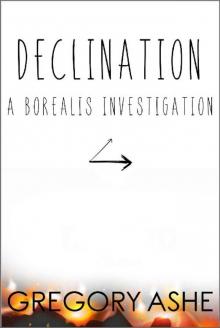 Declination
Declination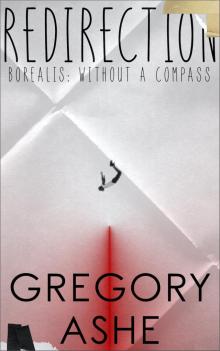 Redirection
Redirection Fold Thunder
Fold Thunder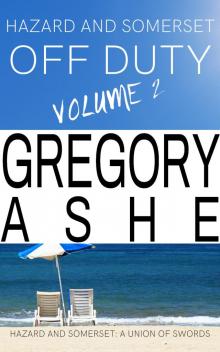 Hazard and Somerset
Hazard and Somerset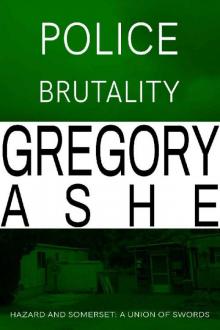 Police Brutality (Hazard and Somerset: A Union of Swords Book 2)
Police Brutality (Hazard and Somerset: A Union of Swords Book 2)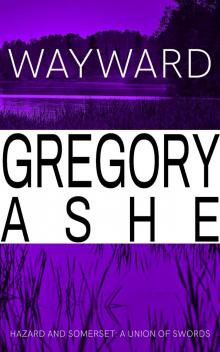 Wayward
Wayward The Same End (The Lamb and the Lion Book 3)
The Same End (The Lamb and the Lion Book 3)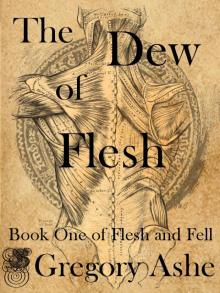 The Dew of Flesh
The Dew of Flesh The Same End
The Same End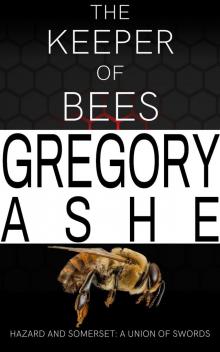 The Keeper of Bees ARC
The Keeper of Bees ARC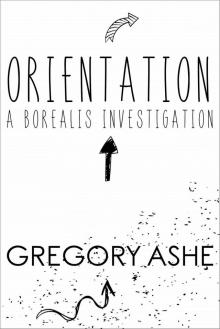 Orientation (Borealis Investigations Book 1)
Orientation (Borealis Investigations Book 1) The Indifferent Children of the Earth
The Indifferent Children of the Earth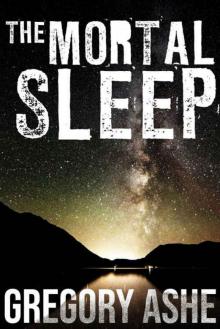 The Mortal Sleep (Hollow Folk Book 4)
The Mortal Sleep (Hollow Folk Book 4)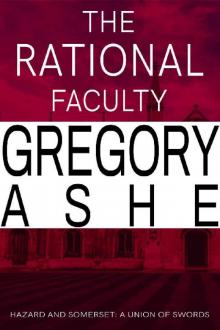 The Rational Faculty (Hazard and Somerset: A Union of Swords Book 1)
The Rational Faculty (Hazard and Somerset: A Union of Swords Book 1) The Weeping Lore (Witte & Co. Investigations Book 1)
The Weeping Lore (Witte & Co. Investigations Book 1)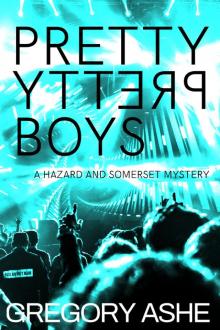 Pretty Pretty Boys
Pretty Pretty Boys Transposition
Transposition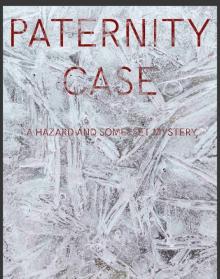 Paternity Case
Paternity Case